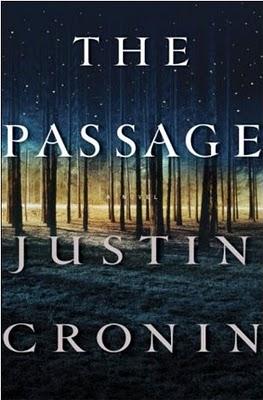The Passage

Trying to explain The Passage is like explaining Lost or the Harry Potter series to an outsider. You end up having to sum it up in the simplest terms: Lost is about people stuck on a really weird island, Harry Potter is about a boy defeating evil wizards, and The Passage is about a little girl trying to save the world. Since this is a review, I’ll go a bit deeper than that, but it might sound ridiculous, so bear with me.
The Passage starts with a military experiment gone wrong. This experiment created beings that resemble vampires (don’t go out during the day, don’t age, feed on humans, etc.), and they have escaped. There’s a little girl, Amy, who was also a subject in the experiment, but who fared better than the others because she retained some of her humanity. The creatures are killing most of the U.S. population, and a man helps Amy escape. We jump forward a hundred years to a small settlement of survivors still trying to protect themselves against these creatures. It’s up to them and Amy to save what’s left of the country, perhaps the world.
No pat description can really do this book justice. The first part could have been a novel all on its own, and it probably would have been one of my favorites if it ended there. But as I kept reading, the storyline, character development, suspense, and surprises made the book unforgettable. Beyond that, there was the strength of the female characters, the significance of race—or lack thereof—in a society that believes they’re the last humans left, and the contemplation of how we pass down our history and what it means to future generations. All of this took me away from any traditional idea of sci-fi, fantasy, or trendy vampire lit to a look at what our culture is and what it could be.
I’ve read through negative reviews of this book, and while I can understand where others are coming from, I don’t agree. The biggest complaint I’ve read is that the book ends abruptly. That’s because this is the first book of three, and there’s more of this story to tell. Even then, The Passage easily stands alone because the first journey is complete by the end.
Another complaint is that while the first part of the book is beautifully written, it stumbles a bit after that. I agree that the first part is written much better than the rest, but it’s something I didn’t worry about as I let myself get into the story rather than focusing on the writing. After a hundred pages or so (a drop in the bucket for a book over 700 pages long), the story and the suspense carried me through to the end.
The best way I can sell this book is to admit that I could not put it down. Even when the story started to slow, even when I found myself awake at three o'clock in the morning with my fiancé groaning that I wasn’t asleep, even when I should have been eating food rather than words during my lunch break, I kept reading. It was hard to leave that world, even for a few hours. I finished all 700+ pages of The Passage in a week, and my only regret is not savoring it more.
I hope you aren’t intimidated by the page count, and I hope you’re not put off by the negative reviews, because this may end up being one of the best books you’ve read in a long time.
Uh... I don't really get down with much fantasy/sci-fi (hate Harry Potter with a passion, dig Ursula Le Guin but she's about it), but Igottta say, this is about the most interesting, captivating review for this I can imagine. You made this sound SO cool! I'm totally putting it on my wish list now. I think my geeky partner will like it too :D